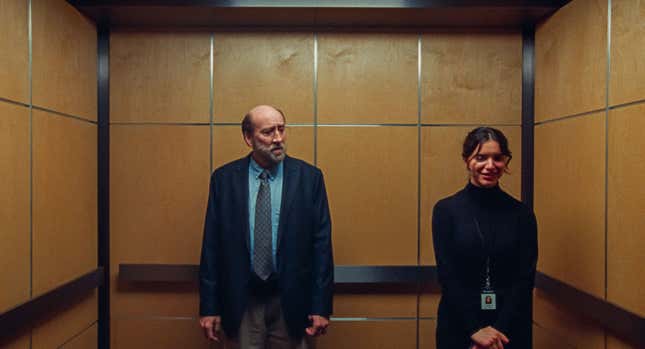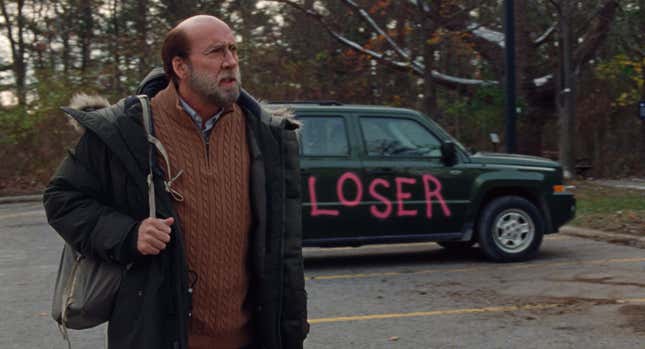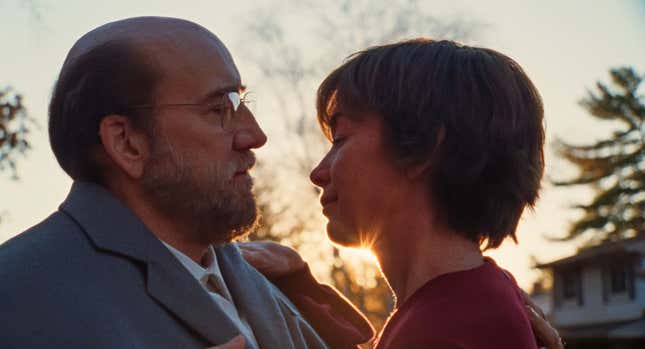
Nic Cage’s Creepy New Film
Who among us hasn’t dreamed about Nicolas Cage? What might it be like to hang out with the Oscar winner, to watch him work or see how he chooses his incredible array of movies? From The Rock, National Treasure, and Renfield, to Adaptation, Wild at Heart, and Mandy, Cage is one of those actors whose career has been so long and so prolific it’s almost impossible to not have thought about him and his life beyond the big screen.
His latest film, Dream Scenario, takes that one step further. Cage is Paul Matthews, a dejected college professor who, one day, starts appearing in the dreams of almost everyone on Earth. How? Why? We don’t know. But instantly, he has the type of fame and recognition he’s always craved without any real effort. But, as tends to happen in modern society, new-found celebrity doesn’t last long and what once was beloved is soon hated. Soon Paul finds himself on the opposite end of the spectrum, and we get to watch how he deals with this impossible situation for better, but mostly worse.
Paul is the creation of writer-director Kristoffer Borgli, a Norweigan filmmaker who still can’t believe he got Nicolas Cage to star in his film, which is only Borgli’s second feature. After Dream Scenario’s U.S. premiere at Fantastic Fest in September, io9 sat down with Borgli to discuss that, as well as where this wild idea for a movie came from, his intentions with it, and so much more.
Dream Scenario opens in select theaters on November 10 before expanding later in the month. Read our full review here and our interview below.

This interview has been edited for length and clarity.
Germain Lussier, io9: So going into this movie all I knew about it was Nicolas Cage shows up in people’s dreams. The trailer kind of plays into that too. But when you see the movie itself, and see how you used that to bring in social media, celebrity culture, and more mainstream ideas, I was really impressed and delighted. Which idea was first and how did one influence the other?
Kristoffer Borgli: Oh, yeah, it’s kind of difficult to try to quantify and map the creative process. There are so many different things that happen at once. I started writing it at the end of 2019. There were definitely just thoughts of how we have kind of parasocial relationships with each other. Like we’re less physically together. We live in each other’s heads more.
io9: Sure. Yeah.
Borgli: There was that. And then as I was writing it, like, the pandemic hits, and there were news stories about people having the same dreams. People reported dreaming the same things, which was like, I was already writing about dreams and the kind of collective unconscious. So I think it was probably all at once. It was thinking about the kind of new culture and how you can kind of stumble into fame and recognition. And I was thinking about my own father, who’s a professor now retired, but how difficult it is sometimes to just try to explain these kinds of new, younger phenomenons, and imagining someone like him getting thrown into kind of a strange phenomenon like this, and how he would probably have difficulties navigating that—and how kind of funny it would be to just track a person who is kind of fumbling with understanding the new culture.
io9: But in terms of the actual writing of it, it could have super leaned into the dream stuff, or could have really leaned into the culture stuff. Also, it could have been very funny or very scary and it’s actually all of those things. How does that develop? Do you outline, or is it just draft after draft after draft?
Borgli: Yeah. Wow. Yeah. I think there’s a reason why I’m not a teacher.
(Both laugh)
Borgli: I have difficulties (explaining how I work.) Like every time I start a script, it’s a mystery to me too. Like, how do I do this again? (Laughs) But when those ideas strike it’s still kind of just a blessing or a surprise. It is an intuitive thing to follow gut instincts. It’s sort of like what Carl Jung said, that people don’t have ideas, ideas have people. So it’s sort of ideas coming to you and demanding that they be written. Something like that.
And there’s the navigation of mapping it onto a script, at least for me when doing both of these last two movies, Sick of Myself and Dream Scenario, which are both multiple genres at once, I just have to follow my gut instinct because there is no rule book to follow. And sometimes it is almost confusing to me too. And I also edit my own stuff. So even in the edit, I’ll be feeling a little bit suddenly insecure about kind of whiplashes between the genres. But I stick to it and I hope that it works, and that’s kind of what I’ve done so far.

io9: And obviously it’s worked. Your last movie was well-received, and even before Nicolas Cage got involved with this one, you had Adam Sandler attached. That’s pretty good. So tell me a little about sort of the Hollywood-ness of like how that happened, how Cage became involved, and also how the meta-ness and prolific nature of Cage’s career changed the movie?
Borgli: Right. Well, I moved to L.A. about six years ago and I just signed a deal with the devil and then…
(Both laugh)
Borgli: It wasn’t that. Like, the whole city, how to get a movie funded? Big mystery to me. I had no idea how to penetrate the system or how to get a foot in the door, at all. Then, pretty early on, someone said you should meet Lars Knudsen, who is Ari Aster’s producing partner. They have Square Peg as a company together. And I’m Scandinavian. Lars is Scandinavian. I think it was as easy as that. And then we started talking, and then I sent him a couple of scripts, and then I got introduced to Ari, and we just started working. It was pretty straightforward.
And from then on, A24 got involved and then it became like a collective discussion of casting. I didn’t even have a wish list. I was just like, “You know, just someone who is good (laughs).” I didn’t think the level that they were thinking at all. So I was surprised that we were even talking those names and like, I’m still kind of baffled that I’ve made a movie with Nicolas Cage. That’s kind of crazy.
And yeah, Nicolas Cage. You know, he definitely embodied his version of Paul Matthews and made him so intensely watchable. I think he ultimately is the man for the job here. But in addition to just craft-wise, being a really good actor, there was something about his life and his persona that has kind of almost outgrown himself. His persona has taken on a life of its own, which is very similar to the movie. It’s what happens in the movie. And it adds another layer that we have a person who’s so identifiable and was probably already in people’s dreams, and now we have to like, bake him in, hide him in this, as they say, remarkable nobody. And that became a fun challenge of, like, how are we gonna get people to forget about the insanely bigger-than-life persona Nicolas Cage and get people to watch Paul Matthews? And, you know, a mix of acting and wardrobe and everything, and there you have it.
io9: The movie never explains exactly what caused Paul to appear in everyone’s dreams, which was smart. But I have to imagine you thought about it. How long did you brainstorm possible ideas before you were like, “You know what? It’s better not knowing.”
Borgli: Yeah, I did try to make sense of it. And it just felt uninteresting to me. My interest is never about a plot. A plot is a necessary evil. What I want to do is I want to watch a character, and I want to watch them change over time. And I want to see that character in situations that will reveal them. And at the same time, I want to look at certain parts of cultural behavior and this concept and the plot is just a way to get to those moments and to watch the change and vulnerability and insecurities of a character unfold on screen.

io9: Well, then you might hate this question, but I’m going to ask anyway. Without spoiling anything, there are specific scenes in the movie that seem to change people’s visions of Paul in their dreams. Did you intend there to be a correlation between events in the real world and people’s perception of him in the dream world?
Borgli: As I wrote it, I saw that his worst sides and his insecurities are what manifests in other people’s dreams. And he changes during the movie. And maybe he feels differently about himself and those personal bad sides are what shows up in other people’s dreams. And it’s kind of like a Jungian idea where he had this concept of the shadow self and the shadow self-being. The neglected worst sides that you have, you need to confront them or they will start manifesting in your subconscious. He even talked about how they might show up in your dreams and haunt you. So this guy’s just dealing with a level of insecurity that’s so extreme that they start not only appearing in his own dreams, but in other people’s dreams. That became a fun idea and also there’s a correlation, maybe causation, maybe correlation between how people see him, how they experience him in dreams, versus what he does and how he acts in this life.
io9: After the movie screening you talked about how much you enjoyed researching all the dream stuff for this. Were there any specific movies that you looked at or thought about that were like, “Oh, that’s an interesting way to handle dreams?” Or like “They already did that, I don’t want to do that.”
Borgli: Dreams in movies, there are really good and really bad versions of it. I think it depends on what you want to do. Do you want to say, like, we’re definitely in a ridiculous dream? We all have really dumb dreams. When you think about them in retrospect, they are so irrational and illogical. I kind of wanted to put you into a dream that feels like it does when you’re dreaming it, when you’re not skeptical when logic is not part of the picture. The dream’s just needed to get you into the feeling of how serious the situation is to the dreamer, and take those moments seriously. And I think (to that end) one reference is 8 1/2, Fellini. David Lynch is (also) a huge inspiration for me. And David Lynch does that too, I think. It’s never really clear when you’re in a dream or not, at least like in something like Mulholland Drive. That was something that I wanted to achieve here, too, that it’s vague when we are in a dream or not.
io9: Finally, the movie never really takes a side in terms of Paul’s actions. I felt it was pretty objective and we see all of it. How purposeful was that? Do you personally have a thought on how he’s treated by society and did you need to have a take to make this movie?
Borgli: Well, I think that what I wanted to look at is a sort of antiquated man in our culture who’s really insecure about his place in the world. Who feels kind of wronged of accolades and has this undying desire for status that he never got. And I wanted to look at a man who, like, loses track of what’s really important. To me, it is like a story of “stop and smell the roses.”
At the beginning of the movie, he has a perspective problem. Like, that is a nice family. That’s a nice home. He has a nice career going. But his perspective is off. And I think I just wanted to look at a man who goes through a moment of crisis, and the crisis reveals parts of him that he didn’t know about himself, that people around him didn’t know about him, and that he has to confront them. And finally kind of sadly realize—maybe too late—what he had, you know? And so I think that me as a writer, I’m really punching this guy to a pulp. Deservedly or not, I deliberately left a little bit open.
I think the movie is a little bit of a warning of the cost of engagement, of engaging too much in the current culture and not understanding the current culture and really fumbling. In the end, it’s kind of like a parable and a little bit of a bittersweet, sad tale of a man who loses track of himself and what’s important in life.
Dream Scenario opens in select theaters November 10.
Want more io9 news? Check out when to expect the latest Marvel, Star Wars, and Star Trek releases, what’s next for the DC Universe on film and TV, and everything you need to know about the future of Doctor Who.

